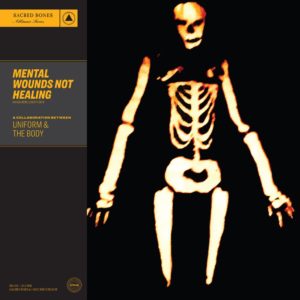
8.5
Magus
Thou
The Baton Rouge-based doom metal quartet Thou has conjured up a new record called Magus. The definition of magus is a sorcerer, and/or a member of the Persian priestly class. These definitions are indicative of the method and the content behind Thou’s funereal dirges, which are at the same time bludgeoning and meditative.
First off, the sorcery aspect. Thou’s sound inspires exultation, whether that be exultation through cathartic release or revelling in disgust at the human condition. Magus is constructed in an intriguing pattern, interspersing shorter, more experimental sound designs in and among the longer, typically sludgy epics. See “My Brother Caliban”, “Divine Will” and “The Law Which Compels”. These interludes expertly and seamlessly trail from the end of the preceding song in order to lure the listener in towards the next raving expostulation, drawing you deeper into the catacombs. “Divine Will”s choral chant invokes mystic rites, and “…Caliban” uses industrial noise and incoherent screams to inspire fear as opposed to the band’s typical head-on approach.
The rest of the record is filled with 6-10 minute palettes of dread, looking with a bleak eye upon the plight of humanity and its follies. Their ominous thundering is composed in movements, relating its structure, as with most avant-garde black metal, closer to classical music than pop/rock. Each song maintains a drudging pace, never speeding beyond a lumbering gait of giants, or mountains toppling. The sound unfolds in vast proportions, like gazing upon a scorched earth while being regaled with the specific tales of the catastrophe. See the duelling guitar bits in the middle of “Inward”, or the shrieking feedback that enters into “Supremacy” as prime examples of the impact that these shifting movements have on the song as a whole, seismic upheavals.
The sonic thread which holds Magus together is such that after listening to it enough, you can close your eyes and generate in your head similar motions, generalized, those pounding drums and hammering chords. Thou plants a seed in your psyche which fuels itself, it colors your waking world and scores your dreams, even while you may not ever be able to remember what any of the individual songs actually sounds like.
The second aspect of magus is the priestly one. Bryan Funck’s vocals sound excellent – piercing, disgusted, rasping, loud, consistently jarring and powerful. However, my biggest complaint about Thou in the past and on this record still remains – to provide some simple and petty criticism – the lyrics are just too clear. Black metal seems to have a particular philosophy and ethos that works within an aesthetic but can at times feel a bit unnecessarily wordy when blatantly confronted with it. Similar to the music, the lyrics are a group of sayings, descriptions and ruminations on the human condition that are hard to recall afterwards for their at times generic quality. Concepts like transcending dualities and finding the true self in the midst of falsehood (“behind the mask, another mask”) are the primary messages. Take this quote from the bandcamp release, “This is an album dedicated to the sacred ego, that wellspring of individuality and unique complexity. Sing the song of the inner voice.” Its inspiring, really, and when it all comes together Magus certainly holds up to that message as a project.
Thou has been incredibly productive over this past year, releasing three EPs before this full-length LP. They continue to be one of the more refreshing and exciting voices in the alternative metal scene, and are uncompromising in their vision. They are consistent and, for all the volume and spectacle, create an inviting world to explore as long as you open yourself to it.
review by Andy Resto
Latest Reviews
Tracks
Related Albums
Related News
Sorry, we couldn't find any posts. Please try a different search.
Advertisement
Looking for something new to listen to?
Sign up to our all-new newsletter for top-notch reviews, news, videos and playlists.






